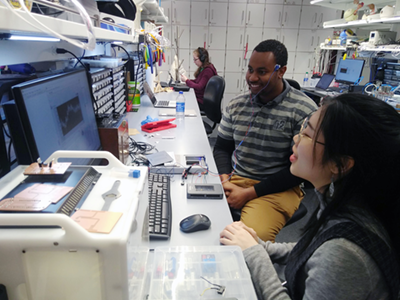
M.Eng.-Industry Collaborations
The Meinig School of Biomedical Engineering M.Eng. program prepares students for professional practice in the healthcare field. As part of this mission, the school fosters connections with industry and medical partners as one way to expose students to real-life biomedical challenges during the course of their degree.
“The objective of these collaborations,” says M.Eng. director Newton de Faria, who seeks to fortify and expand upon these relationships, “is a mutually-valuable relationship where students and companies alike have the opportunity and resources to create and innovate.”
West Pharmaceutical Services and Hillrom (previously Welch Allyn) are two companies that have participated from the very beginning, and collectively have sponsored more than 45 student design projects along the way. These projects generally relate to each company’s current and future technology portfolio. For West, this includes drug delivery technologies, and for Hillrom, medical devices. Examples of past projects include drug delivery and measurement devices, as well as testing and evaluation systems.
As part of an official collaboration agreement with Cornell, West not only provides financial support but also offers a pre-program summer internship for select incoming M.Eng. students. Those students enter orientation in the fall with a design project already chosen based on that experience, and each year West proactively supports this student team with regular mentoring. Most recently this has been led by Dr. Alex Lyness, West manager of research & technology, who had the following to say of the partnership:
“[The collaboration] has been very successful over the past decade. Having students work on a real-world project through their studies is a great learning experience in both directions and has led to many being recruited to the company. This summer we are pleased to have had two Cornell BME graduates join our Innovation & Technology Division. We look forward to what they both deliver to West and to many more years collaborating with Cornell.”
Hillrom provides at least two projects annually that give students insight and access to the medical device industry segments. Students working on these projects are mentored throughout the process by John Lane, Hillrom director of electrical technology, research and development - advanced technology group, as well as other senior Hillrom R&D staff.
“For over 10 years, the BME M.Eng. student teams at Cornell have enabled our R&D staff to explore new areas of medical product research while at the same time providing a real-world medical device development experience for the students," said Lane. “Dr. de Faria has set up a team-centric agile-type process that closely mirrors our development team’s collaborative and iterative environment.”
Dr. de Faria is proud of how these partnerships lead to successful outcomes for students and companies alike. “Partners get access to talent and technology at the Meinig School, as well as a process and a whole infrastructure that delivers knowledge acquired during that process. Students have the opportunity to experience real-world projects in a way different from a traditional internship. They get valuable insight into the product development process and working within a corporate structure before heading into the job market themselves.”

One of the best outcomes of these partnerships is when they lead to jobs. Len Magara, M.Eng. '20, was hired by West Pharmaceutical as a biomedical engineer this year. Magara met Dr. Lyness when he gave a talk at the Meinig School. “I can credit that interaction and experience as the first contact that led to this position,” says Magara. “My experiences designing and prototyping within the maker space during my M.Eng. have been invaluable in helping me succeed in activities I have been involved in so far (at West).”
This is not a one-off situation, says De Faria. “Partner companies routinely hire our students.”
Sponsors can provide support in a variety of ways over a project’s lifetime, by way of equipment, administrative (such as patent-filing), or advisory support. They can also participate in the annual M.Eng. Industry Engagement Day, on which students come together with alumni and industry professionals to network and showcase their year-long design projects.
The program is looking to develop further relationships with industry and other sponsors to build on these successes, says de Faria, especially for proof-of-principle projects for real-life challenges. “There are some ad hoc partnerships now and then,” said De Faria, “but it’s good for companies to get in touch to see what might be a good fit.” Contact Dr. de Faria directly with any inquiries: newton.defaria@cornell.edu.

